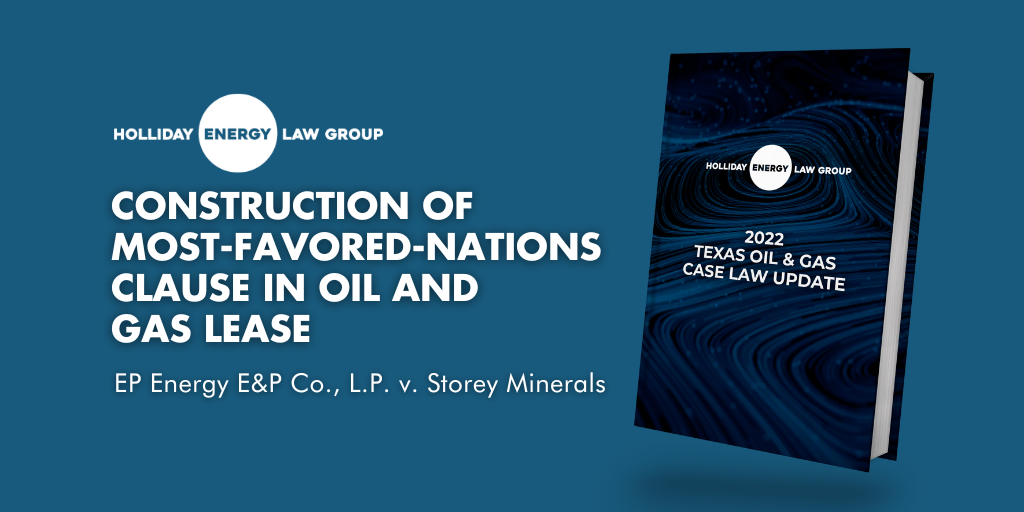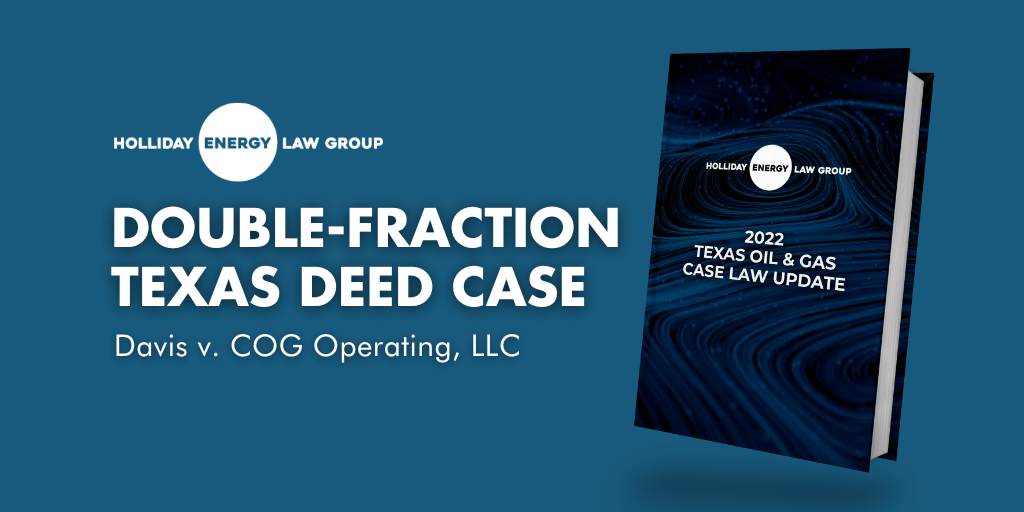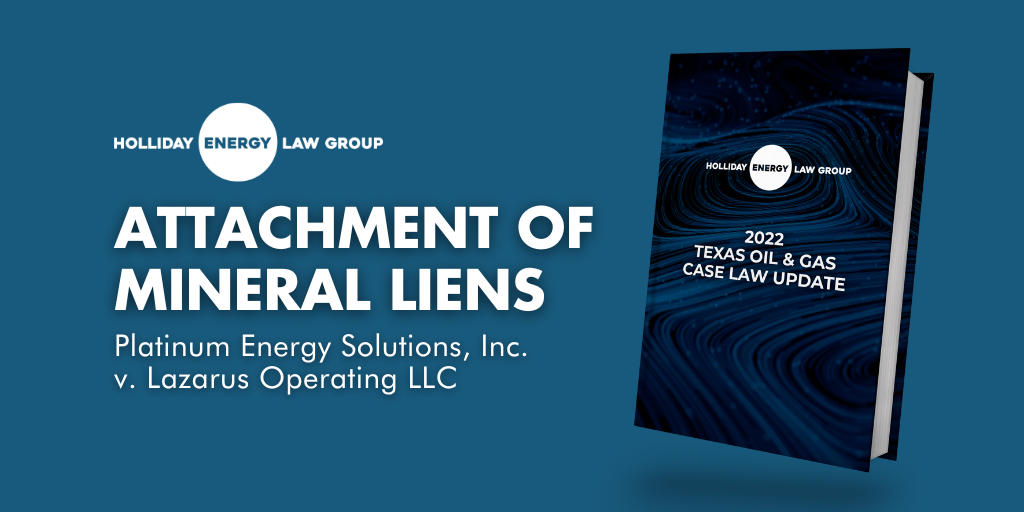Construction of Most-Favored-Nations clause in Oil and Gas Lease.

EP Energy E&P Co., L.P. v. Storey Minerals, LTD, No. 04-19-00534-CV, 2022 WL 223253 (Tex. App.—San Antonio Jan. 26, 2022, pet. filed). Construction of Most-Favored-Nations clause in Oil and Gas Lease.
At issue in this case is the construction of most-favored-nations (MFN) clauses contained in identical oil and gas leases. Specifically, the number of additional bonuses due to lessors upon the triggering of said clause, and whether the lower court failed to consider surrounding circumstances while construing the clause.
Key Takeaways
- If you are an operator and grant a most-favored-nations clause in an oil and gas lease:
a. You should very, very clearly understand the scope of the lands impacted by the MFN clause. By you, we mean literally you, as well as anyone at the company, any field landmen, lease brokers, agents, outside counsel, your hamster; EVERYONE.
b. Before executing any subsequent leases within the MFN area, fully understand the impact that said subsequent lease could have from a bonus payment and/or operational standpoint.
c. Quadruple-check point b. - To aid courts in considering the construction of an unambiguous oil and gas lease, surrounding circumstances may be considered. However, the objective facts and circumstances cannot be used to add, alter, or change agreed-upon lease terms.
Origin of the Dispute
In 2009, Storey Minerals, Ltd., Maltsberger/Storey Ranch, LLC, and Rene R. Barrientos, Ltd. (hereinafter “MSB”), entered into three identical oil and gas leases containing most-favored-nations clauses (MFN) with EP Energy E&P Company, L.P. (hereinafter “EP”). Under Article II of the three leases (hereinafter “A leases”), EP was required to pay $500 in bonuses per net mineral acre (NMA) for the right to lease MSB’s property. Later, EP took two additional leases – the First Presbyterian and Donaldson Brown leases – at $5,200 per NMA, which MSB maintained triggered the A leases’ MFN clauses. If the MFN applied, MSB would be owed an additional $4,700/acre on the A leases.
Believing that the First Presbyterian and Donaldson Brown leases had triggered their MFN clause, MSB demanded to review the lease forms. Eventually, EP obliged and tendered an amendment to the A leases, which increased bonuses, but did not increase delay rentals. After the parties failed to agree on amounts due for bonuses and delay rentals, MSB filed suit for breach of the A leases.
MSB’s motion for partial summary judgment asserted that EP breached the MFN clause after failing to amend the leases and increase bonuses and delay rental payments. MSB also sought specific performance, in the form of amended A leases, as well as damages. In response, EP moved for summary judgment on MSB’s claim and argued the MFN clause’s plain language and surrounding circumstances proved that no breach had occurred because an amendment to the A leases was tendered and EP had offered true-up bonus payments. Additionally, EP argued that MSB was never entitled to specific performance.
The trial court ruled in favor of MSB, finding that EP breached the MFN clause, and required it to amend the A leases, as well as pay $41 MILLION IN UNPAID BONUSES (being the difference between the original bonus and the higher Donaldson Brown lease bonus). The court, however, denied MSB’s summary judgment motion on payment of delay rentals, finding that neither triggering lease called for rental increases. EP Energy timely appealed.
Lease Construction
- Plain Language of the MFN Clause
On appeal, EP asserted that the trial court had erroneously ordered the lease amendment, following a misconstruction of the MFN clauses’ plain language; as such, EP argued that the trial court failed to consider surrounding circumstances in construing the clause.
It is important to note that both parties agreed that the MFN clauses’ plain language was unambiguous (i.e., subject to only one reasonable interpretation), though they disagreed vehemently as to the proper interpretation. Specifically, the parties disagreed on EP obligations under the following part of the clause:
If at any time during the existence of this lease, the lessee ... acquires an Oil and Gas Lease on a portion of the leased premises with any ... entity that owns a mineral interest in the leased premises on such terms that the ... bonus ... [is] greater than th[at] provided to be paid to lessor hereunder, lessee expressly stipulates, warrants, and agrees that it will execute an amendment to this lease, effective as of the date of the third party lease on the leased premises, to provide that the lessor hereunder shall receive thereafter the same percentage (per net mineral acre) ... bonus ... as any subsequent lessor of the leased premises to the extent that such ... bonus ... [is] greater than those provided to be paid herein. To the extent that the ... bonus ... in any subsequent lease [is] less than provided herein, lessor hereunder shall continue to receive the ... bonus ... as provided in this lease.... This Paragraph XXVI shall not apply to any lease or contract with a mineral owner that covers less than twenty (20) net mineral acres.
Both parties agreed that 1) EP acquired the leases subject to the MFN clause, which provided a bonus “greater than those provided to be paid” to MSB, and 2) EP was required to “execute an amendment to [the A leases], effective as of the date of the third party lease on the leased premises, to provide that [MSB] shall receive the same net percentage (per net mineral acre)” of bonus on the A leases as the third party lease. In other words, the parties agreed that the MSB lease’s MFN clause required EP to amend the A leases and to equalize MSB’s bonus per NMA in the event that a lease was on the same acreage taken from a third party (i.e., from an undivided interest owner) at a higher rate.
EP argued, however, that they were only obligated to pay beginning on the newly acquired lease’s effective date if there were bonuses they decided were payable from the effective date forward on acreage subject to the A leases. To clarify, the Donaldson Brown lease was effective September 25, 2013, five days before the end of the A leases’ September 30, 2013, primary term. Their interpretation of the MFN clause required they pay $4,700 per NMA, the difference between $5,200 and the A leases original $500, only for acreage it decided to pay bonuses on during those five days. In other words, though they had obtained a lease on acreage within the subject lands at a much higher bonus rate, otherwise triggering the MFN clause, because they could elect not to pay the bonus during those five days, they were not obligated to abide by the MFN clause.
[Let’s pause here for a safety moment and note: You read that correctly. The MSB lease expired on September 30th. The new lease, which triggered the $4700/acre additional payment, was dated effective September 25th. Five days. Someone was not paying attention. As my youngest daughter likes to say, “Ooopsie.” Only this was an approximate $41,000,000.00 ooopsie.
MORAL OF THE STORY: 1) Always pay attention to your lease form and be mindful of the second and third order effects of the terms on your planned development for the area. 2) In the event an MFN clause or something similar is granted, make absolutely sure that you communicate this to the entire team – inhouse, brokers, etc. – so that you can avoid accidental/unintended triggering of any such clauses.]
Conversely, MSB argued that under the plain language of the lease they were entitled to the full $4,700/acre bonus for all acreage subject to the A leases as of September 25, 2013. This was based on the simple fact that the Donaldson Brown lease, a lease within the clearly defined area, was taken at $5,200 per NMA during the A leases’ term.
The trial court agreed with MSB, holding that the MFN clause provided a $4,700 bonus and amended A leases, effective as of September 25, 2013.
Expanding on the analysis, the court unpacked EP’s misunderstanding of the MFN clause. Under EP’s reading, the MFN clause divided bonuses into two categories – a) bonuses paid BEFORE triggering the MFN clause, and b) bonuses paid AFTER triggering the MFN clause. Bonuses paid before triggering the clause were entitled to the $500 bonus. On the other hand, bonuses paid after triggering the clause were entitled to a greater bonus, equal to the difference between the higher bonus amount in a triggering lease and the original $500 if EP concluded MSB was entitled to a bonus on the acreage.
Sounds confusing and nonsensical because it is. We’ve read it a few times and it just doesn’t make sense. Apparently, the court agreed, holding that “[i]f the parties had intended to divide the bonuses based on the MFN clause, as [EP] reads it, the clause would have stated that plainly. However, the MFN clause includes no such language, and we cannot imply it.
Disputed Terms and Prospective Lease Construction
The appellate court briefly highlighted the disputed terms within the MFN clause. In particular, the meanings of “effective” and “thereafter.” After applying the common definitions to the MFN clause, as a substitute for the disputed terms, the court ruled the language was properly applied and required EP Energy to pay the higher per NMA bonus.
More specifically, EP’s argument that “effective” called for a prospective rather than retroactive construction was deemed out of context. As the parties intended, “effective” simply meant the executed amendment operated “as of the date of the third-party lease,” whereas EP wrongly argued that requiring the amendment “effective on the effective date” made retroactive construction meaningless.
Additionally, EP contended use of “thereafter,” rather than “theretofore,” supported the MFN clause’s prospective application, with the latter having retroactive meaning. However, the court found that the use of “theretofore” elsewhere in the A leases was too sparse and unrelated to evidence the parties’ intent to use a prospective construction. Moreover, by arguing that the meaning of the whole MFN clause was the opposite of theretofore’s retroactive meaning, EP ignored the parties’ use of words in the MFN clause.
Despite additional EP arguments ultimately focused on semantics, the appellate court determined that the various constructions put forth by EP fell outside of the MFN clause’s plain language. Instead, the court made clear that the MFN clause provided straightforward instructions to each party: “if the bonus amount is higher in a triggering lease, (1) execute an amendment to the A leases to provide the same bonus per net mineral acre as the triggering lease, and (2) pay the same bonus per net mineral acre as the triggering lease.”
Surrounding Circumstances
Next EP argued that the lower court improperly construed the MFN clause by failing to consider the surrounding circumstances that support their argument that no MFN breach occurred.
Texas law provides that in order to aid in construing an unambiguous lease, a court may in fact consider facts and circumstances surrounding a lease’s execution to aid in construction. However, in the case of an unambiguous document, the court is not allowed to “delve into the parties’ intent beyond what their agreement plainly yields,” and those facts and circumstances cannot be used to make the agreement say what it unambiguously does not say, “to show what the parties probably, or could have meant” or otherwise “add, alter, or change the contracts’ agreed-to terms.”
Illustrating what these facts and circumstances could look like, the court noted that while only objective facts and circumstances could be considered, these could include:
1. The commercial or business setting in which the contract negotiation took place;
2. The parties’ sophistication;
3. Trade custom and usage, as relevant;
4. Facts attending the agreement’s execution if they do not transform the meaning of the unambiguous language; and
5. Any other objective facts and circumstances that do not add to, alter, or contradict the agreement’s meaning.
Notably, at the time the parties executed the leases, MSB may not have had clear title to all the subject lands’ acreage. Nonetheless, an addendum was added to recognize that EP would pay bonuses on said acreage later, after title cleared. However, this addendum did not amend Article II’s $500 bonus amounts, nor the MFN clause. EP asserted that the fact MSB possibly lacked clear title during lease execution supported their reading of the MFN clause that bonus was only due on acreage that EP decided to pay bonus on. To the contrary, the court found the contention impermissibly added to, altered, or contradicted the MFN clause’s clear and unambiguous language.
Holding
The Court of Appeals held the trial court’s grant of summary judgment in favor of MSB was proper, though the claims for specific performance were denied.
EP filed a petition for review with the Supreme Court of Texas, so stay tuned. Oil and Gas professionals should note that MFN clauses intended to operate with prospective effect should be drafted with that intent made clear, as courts are reluctant to imply it.
For a more detailed insight into the 2022 Texas Oil & Gas Case Law Update, download the HELG paper.


